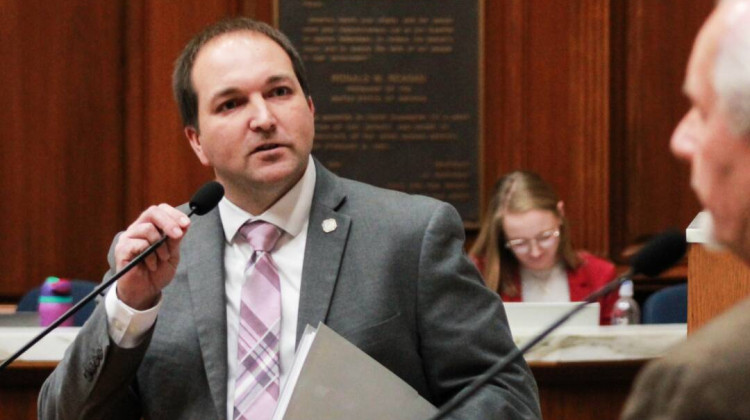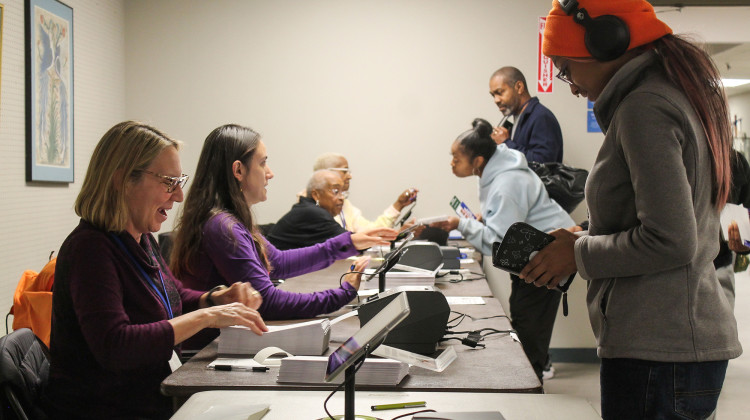
Rep. Jeff Thompson (R-Lizton) speaks with reporters on Friday, Feb. 17, 2023 after unveiling the House GOP budget proposal he led, his first as chair of the House Ways and Means Committee.
Alan Mbathi/IPB NewsHouse Republicans unveiled their proposed state budget Friday, one its architect said is focused on “opportunity” for students, families and taxpayers.
The proposal, HB 1001, includes a huge boost in K-12 education spending, part of which is a dramatic increase for private school vouchers.
The House GOP budget includes nearly $18 billion for the K-12 funding formula – an increase of more than 10 percent from the last state budget.
But more than $1 billion of that is tabbed for private schools. House Republicans want to allow families of four that earn up to about $220,000 a year to be eligible for vouchers. And budget architect Rep. Jeff Thompson (R-Lizton) said their plan removes all other requirements for eligibility, including one that made most voucher students first spend time in a public school.
“We want those families to have the best choice they can have, with regard to where their children should go,” Thompson said.
Spending on the voucher program would account for more than a quarter of the proposed increase in overall K-12 funding.
Indiana Democrats have long decried the significant increases in school voucher spending, arguing it drains money from public schools, where around 90 percent of Hoosier children are educated.
Join the conversation and sign up for the Indiana Two-Way. Text "Indiana" to 73224. Your comments and questions in response to our weekly text help us find the answers you need on statewide issues throughout the legislative session. And follow along with our bill tracker.
And a Senate Republican leader recently issued a stern warning to private schools over what he perceives as a lack of accountability in the voucher program.
The House Republican budget plan also speeds up income tax cuts that were passed last year. Under the current timeline, the income tax rate would gradually go down to 2.9 percent by 2029 – and only if state revenues continued to grow.
READ MORE: Hoosiers' income taxes going down a little, starting Jan. 1
Now, Thompson said the rate will hit 2.9 percent – down from its current 3.15 percent – by 2026, regardless of what the economy does to state budgets.
“Hoosier taxpayers would be the best place to have those additional dollars," Thompson said. "And they can spend those the most wisely.”
The current income tax cut timeline saves a Hoosier making $50,000 per year about $325 total over the next six years. The accelerated timeline would save them about $650 over that same period.
Thompson will formally present the budget proposal in a House committee Monday.
The House Republican plan spends significantly less on public and mental health than the governor or Senate Republicans are hoping for.
Indiana is one of the worst states in the country for spending on public health. Gov. Eric Holcomb and his public health commission proposed a dramatic increase in such spending – nearly $350 million in the governor’s proposed budget.
The House GOP plan would spend $225 million. Thompson said that’s still a big boost.
“We look forward to working with our local county commissioners and local health departments and other providers to improve our state’s health,” Thompson said.
Senate Republicans hope to increase funding for community mental health centers by $30 million. The House GOP plan doesn’t include any money for that, though it does spend $10 million to help regional facilities treat more people who’ve been incarcerated with mental health challenges. That aligns with a House Republican priority bill, HB 1006.
Thompson acknowledged the House Republican proposal is an early step in a long budget process.
There are several priorities of the governor's that got at least some attention in the budget. The House GOP budget delivers one of Holcomb's biggest asks in full: eliminating textbook and curriculum materials fees for Hoosier K-12 students. The governor made that a tentpole in his State of the State address (and it's long been a priority for Indiana Statehouse Democrats).
The House Republican plan also fulfills requests from the governor to raise Medicaid reimbursement rates for some providers, fund another round of READI grants at $500 million, give $650 million to the Indiana Economic Development Corporation to help acquire job sites for private companies and close deals to lure more businesses to the state and increase the starting salary for Indiana state troopers to $70,000 a year.
A key House GOP priority also finally has a funding figure. To address the state's housing shortage, HB 1005 creates a revolving loan fund local governments can use to pay for infrastructure costs for new housing. The budget plan puts $50 million into that fund.
Brandon is our Statehouse bureau chief. Contact him at bsmith@ipbs.org or follow him on Twitter at @brandonjsmith5.
9(MDAyMzk1MzA4MDE2MjY3OTY1MjM5ZDJjYQ000))
 DONATE
DONATE






 Support WFYI. We can't do it without you.
Support WFYI. We can't do it without you.